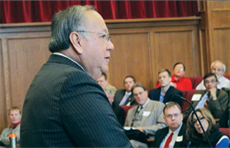
By Gary Fife
 NORMAN, Okla.—The exercise of sovereignty for Native Americans and other native peoples of this hemisphere may best be accomplished through commerce—with one another and with the rest of the world.
NORMAN, Okla.—The exercise of sovereignty for Native Americans and other native peoples of this hemisphere may best be accomplished through commerce—with one another and with the rest of the world.
Those were the thoughts of various speakers sharing information at the “Tribal Sovereignty—A Global Perspective” forum at the University of Oklahoma School of Law, Feb. 27.
Muscogee (Creek) Nation Principal Chief George Tiger delivered the morning keynote address. He listed the economic progress the tribe has made due to the flexing of the MCN sovereign status. Much of that, he said, came from the MCN becoming involved in gaming.
The MCN he noted, first started with high stakes bingo and now, has sophisticated and elaborate casinos. That use of its sovereignty, Tiger said, paid off.
“Now, because of gaming, we’re big players, if you will, here in Oklahoma. You know, it’s always great to see our tribal leaders, here in the state of Oklahoma, with their heads held just a little bit higher, than it used to be. Because gaming has allowed us to not necessarily even the playing field, but it’s allowed us to do a lot of things.”
Tiger felt that course had led to more local and state authorities paying attention to the tribal governments, “Collectively, as tribes here in Oklahoma, we’re making sure that the state legislature and Gov. (Mary) Fallin’s office, anyone having to do anything with the state, knows we’re very important to what’s going on here in the state of Oklahoma.”
He cited statistics showing that tribes and the MCN were among the largest employers and economic contributors in the state, and pointed out that this situation would have not developed had it not been for tribe’s inherent sovereignty.
“For a long time, the City of Tulsa, and the County of Tulsa didn’t want to have anything to do with us. Some of you remember, when we got into high stakes bingo, they shut us down, they said we were a public nuisance. Low and behold, today, they got us listed on tourism stops in the city of Tulsa.”
On the international level, Tiger thought the economic leverage rather than the political status would be the most beneficial for tribal governments.
“I think we’re ready to reach out there, if you will, on a global setting. We already have to see degree through MNBE (Muscogee Nation Business Enterprise) and what they’re doing in Afghanistan and Mexico with the contracts they’re getting. But we want to step it up, if you will, to be able to work with other foreign countries. I’ve been approached on a number of occasions by people from China and other different places that want to look at possible investment opportunities with our nation. Looking at a global perspective and maybe job opportunities that may be brought to Creek Nation, not away from our soil, but on our soil.”
Along with the OU School of Law, the school’s Native American Studies Department co-sponsored the symposium. Interim Department Director, Dr. Gus Palmer, Jr. said this discussion of the global perspective was important as tribes determine more of their own futures.
“I think the purpose, from Native American Studies perspective is that we’ve enlarged our commitment to our people and our communities. Indian communities are depending on other sources, other than the sources they had. I think through self-determination Indian tribes are taking advantage of other entities—governmental entities, business and economic development entities, so that they can strengthen their own tribal governments and communities.”
 Armstrong Wiggins, a Miskito Indian from Nicaragua, was one of the resource people on the symposium program.
Armstrong Wiggins, a Miskito Indian from Nicaragua, was one of the resource people on the symposium program.
He has been actively promoting Miskito rights and recognition in that country and the United Nations since the 1970’s. Wiggins is one of the authors of the United Nations Declaration on the Rights of Indigenous Peoples. Currently, he is a Director of the American Indian Law Resource Center in Washington, D.C.
Wiggins said it was important for American tribal governments and those in other parts of the hemisphere to remind the world that they have survived colonial rule and are still pressing for their rights and self-determination. The use of tribal sovereignty of the American Indian Nations, as discussed at this forum, he said could be enhanced as it is brought to the global perspective.
“I think that is a very positive step from the international side of it. But, we have our own government and how we can strengthen that by using this political declaration that we have challenged, especially in the U.S. government, challenge all the U.S. agencies that need to change their policies, especially the Bureau of Indian Affairs.”
He called for more education between native peoples and for them to travel see first-hand those cultures and see how they live.
When told of the MCN’s recent cultural exchange program to Managua, Nicaragua, that was a beginning, he said, but those delegations still need to get beyond the capital city and into the countryside of the Indian peoples.
“I think if they go and don’t go and meet our people, and they only go to Managua, then it doesn’t help them, because they need to go to our territories, which is kind of isolated, but you can get there if you coordinate with our leaders. Maybe, it’s a first step to go to Managua, but they should go to the Atlantic coast of Nicaragua, south and north, especially north where the Miskito nation is.”
